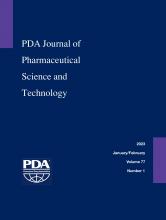Abstract
As the complexities of the pharmaceuticals needed to prevail over serious diseases continue to grow, the need for technologies to enable their efficient storage and delivery are as essential as ever. Lately, drugs such as vaccines, proteins, and stem cells are increasingly requiring frozen storage to maintain their efficacies before use. Notably, the advent of cellular therapy products has invariably elevated the need for cryopreservation and frozen storage of cellular starting materials, intermediates, and/or final product. The container closure integrity (CCI)—which is a major requirement for aseptic or sterile packaging systems—at these extremely low temperatures has not been fully understood. For vial-based systems particularly, the commonly used rubber stoppers are expected to lose their elastic properties below their glass transition temperatures, suggesting a potential temporary loss of sealability under frozen storage conditions and posing a risk to CCI. The measurement of the CCI at these conditions such as −80°C is therefore critical; a process that can be very challenging. Previous works had explored the use of Oxygen Headspace Analysis to measure CCI at low temperatures. Here, we present the evaluation of the CCI of rubber-stoppered aluminosilicate glass vials (Valor®) and plastic vials (Crystal Zenith®) using the helium leak CCI test method at −80°C, with correlation to residual seal force (RSF). The results and their implications are then discussed with regard to the suitability of certain packaging components as frozen storage container closure systems.
- Frozen storage
- Helium leak
- Container closure integrity test
- Corning Valor® glass
- Crystal Zenith® plastic
- Residual seal force
- © PDA, Inc. 2023
PDA members receive access to all articles published in the current year and previous volume year. Institutional subscribers received access to all content. Log in below to receive access to this article if you are either of these.
If you are neither or you are a PDA member trying to access an article outside of your membership license, then you must purchase access to this article (below). If you do not have a username or password for JPST, you will be required to create an account prior to purchasing.
Full issue PDFs are for PDA members only.
Note to pda.org users
The PDA and PDA bookstore websites (www.pda.org and www.pda.org/bookstore) are separate websites from the PDA JPST website. When you first join PDA, your initial UserID and Password are sent to HighWirePress to create your PDA JPST account. Subsequent UserrID and Password changes required at the PDA websites will not pass on to PDA JPST and vice versa. If you forget your PDA JPST UserID and/or Password, you can request help to retrieve UserID and reset Password below.






